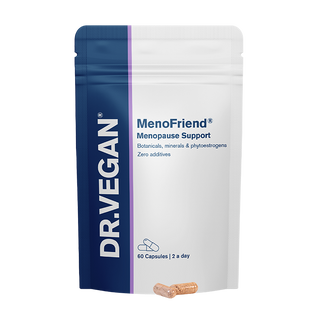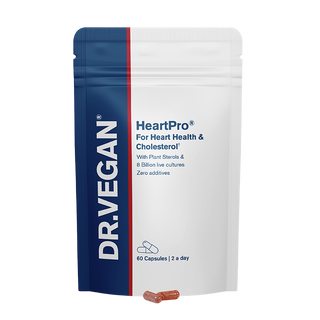Heart disease and menopause: What you need to know

Menopause is just a part of life, but lots of us don't really know what to expect, especially when it comes to our hearts. Many people think menopause is all about hot flushes or brain fog. But did you know that after menopause your chance of getting heart disease - which is the number one killer of women - significantly increases? We just don't talk about it enough. Hormone health and menopause expert Dr. Katie Hodgkinson of Hampshire Health & Hormones, explains the risks of heart disease for women after menopause.
Why does menopause increase heart risk?
Before menopause, women usually have a lower risk of heart issues than men. This is partly because of oestrogen, a hormone that helps keep blood vessels flexible, helps with good cholesterol, and reduces swelling. But when menopause starts, oestrogen levels reduce. Blood vessels can get stiff. Bad cholesterol might go up, and good cholesterol might drop.
Before menopause, women are less likely to have heart problems than men.
After menopause, that risk increases and is sometimes even higher than men’s.
By the time they're 70, women are more likely than men to die after their first heart attack. One large study showed that 26% of women die within a year of a heart attack, compared to 19% of men.1
MenoFriend®

Heart issues in women can go unnoticed. The signs can be different and sometimes brushed aside. Women might feel unusual chest discomfort, jaw pain, feel sick, or fatigued. They don't always get the crushing chest pain that men often get.
Discover our Menopause Hub, it includes resources to help support women through all stages of the menopause.
Why aren't more women aware of the risk?
Many people think breast cancer is the biggest risk of death in women. But heart disease kills over twice as many women each year.2 In one survey, less than half of women knew heart disease was the top cause of death for women. Even fewer knew how menopause changes that risk. We need to change this so that we can do things to lower the risk.
How can I protect my heart?
You have more power than you think. Menopause is a good time to get checked out by your doctor and make some changes that can really help.
Get checked for heart risk factors: Ask your doctor to check your cholesterol, blood pressure, and blood sugar. Small changes now can stop bigger problems later.
Get moving: Try to get at least 30 minutes of exercise most days, like brisk walking, dancing, swimming, or biking. Gardening also helps. Learn why exercise helps through menopause.
Eat heart-healthy food: Eating well is one of the best things you can do to protect your heart health.
- Eat lots of colourful fruit and vegetables.
- Pick whole grains (like oats, brown rice, or wholemeal bread) instead of white bread.
- Eat fish (like salmon) once or twice a week for healthy fats.
- Have some nuts and seeds.
- Use olive oil instead of butter.
- Eat less processed foods which are high in salt, sugar, and bad fats.
- Eat less red meat and processed meats – try beans, lentils (or chicken) instead.
Watch the alcohol: Don’t go above the recommended amount (no more than 14 units a week) and have some days without any alcohol. Discover if alcohol affects the menopause.
Quit smoking: It's never too late. Stopping can lower your heart disease risk right away.
Sleep well and lower stress: Not enough sleep and stress can raise blood pressure. Try to relax with things like yoga, or just be outside or go for walks. Learn how stress affects the heart.
Consider HRT if you have menopause symptoms: HRT can help with menopause symptoms and might help with your heart; however, it depends on the timing of when HRT is started. You may be interested in reading 'Top 10 questions about HRT answered.'
Impact of HRT on heart disease risk
The British Menopause Society says that ‘HRT initiated before the age of 60 or within 10 years of the menopause is likely to be associated with a reduction in coronary heart disease and cardiovascular mortality’.
One review of large studies, in particular the Cochrane database and World Health Initiative, showed no increased risk of heart events or death from heart disease in people who started HRT more than 10 years after menopause. The British Menopause Society advises that If HRT is used after 60, to use lower doses, and use oestrogen on the skin because taking it as a pill can raise the chance of blood clots.
HeartPro®

The British Menopause Society,3 NICE,4 and the North American Menopause Society5 all agree that HRT shouldn't just be used to stop heart disease. HRT is primarily for menopause symptoms, and if it helps your heart, that's great too!
If HRT can lower my heart risk, why doesn't everyone take it?
HRT can help some women's hearts if started early, but some types of HRT can raise risks like blood clots, stroke, and HRT can (sometimes) increase risk of breast cancer although this is generally low risk. The risks depend on your age, health, and when you start taking HRT. In some cases, the possible risks of taking HRT may outweigh the heart health benefits.
For most women, the best way to protect your heart is a healthy lifestyle: eat well, stay active, don't smoke, chill out, and get regular check-ups!
View our range of award-winning probiotics, vitamins and supplements.
Other articles you may enjoy:
















